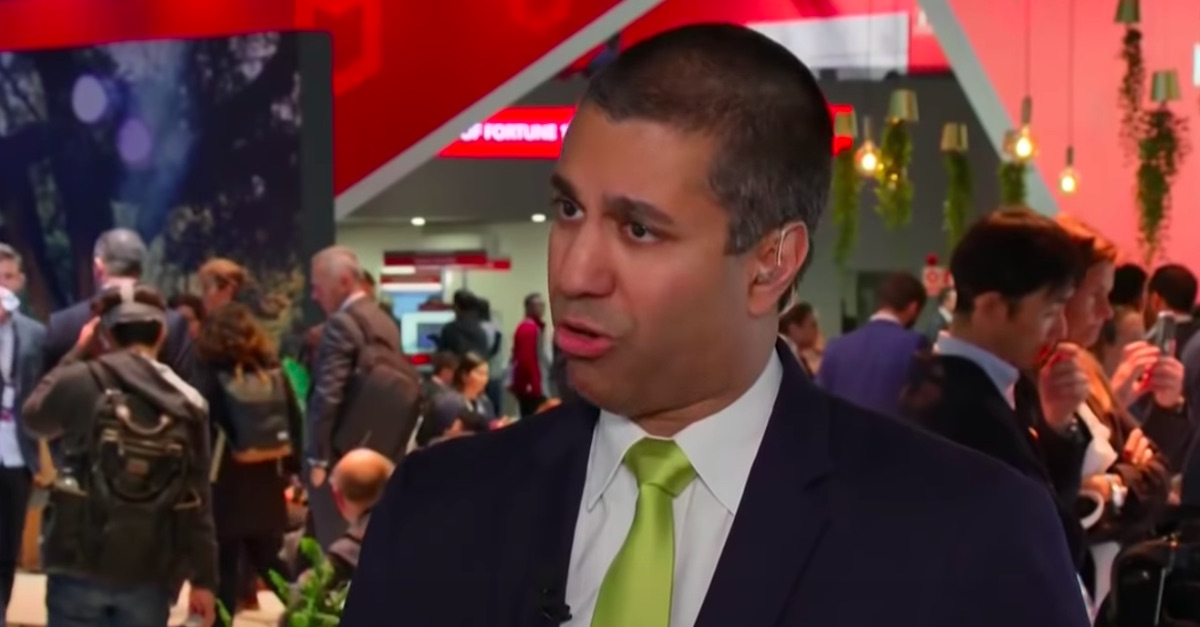
Federal Communications Commission Chairman (FCC) Ajit Pai on Thursday said he plans to move forward with rulemaking to “clarify” the scope of Section 230 of the Communications Decency Act of 1996. But his statement was immediately panned by attorneys as misstating both the substance of the law as well as the FCC’s authority to interpret the meaning of the law.
“What does Section 230 currently mean? Many advance an overly broad interpretation that in some cases shields social media companies from consumer protection laws in a way that has no basis in the text of Section 230. The Commission’s General Counsel has informed me that the FCC has the legal authority to interpret Section 230. Consistent with this advice, I intend to move forward with a rulemaking to clarify its meaning,” Pai wrote. “Social media companies have a Frist Amendment right to free speech. But they do not have a First Amendment right to a special immunity denied to other media outlets, such as newspapers and broadcasters.”
But despite couching the FCC’s rulemaking undertaking as an effort to “interpret” Section 230, lawyers, particularly those specializing in free speech advocacy and law, were quick to point out that the text of the statute is actually extremely straightforward, and doesn’t create any “special immunity” for internet companies.
“The law is pretty fucking clear, Ajit,” First Amendment attorney Ari Cohen bluntly wrote in response to Pai’s tweet.
Others, such as Columbia law professor Tim Wu and attorney and FCC commissioner Jessica Rosenworcel wondered whether the FCC latest attack on Section 230 was actually motivated by political concerns.
https://twitter.com/superwuster/status/1316818331568046086?s=20
The text of Section 230 states that “no provider or user of an interactive computer service shall be treated as the publisher or speaker of any information provided by another information content provider,” meaning the platforms are not responsible for the content posted by its users.
It also provides liability protection for “any action voluntarily taken in good faith to restrict access to or availability of material that the provider or user considers to be obscene, lewd, lascivious, filthy, excessively violent, harassing, or otherwise objectionable, whether or not such material is constitutionally protected,” meaning the platforms can moderate the sites as they see fit. Additionally, Section 230 has no requirement that the sites moderate content in a neutral manner, and creates no legal distinction between a platform and a publisher.
The latest controversy over Section 230 stems from privately-owned social media companies such as Twitter and Facebook choosing not to allow widespread sharing over an extremely suspicious New York Post story involving a laptop allegedly left at the computer repair shop by Hunter Biden. In an interview with news outlets on Wednesday, the Trump-supporting owner of the store did little to allay suspicions surrounding the reporting, but President Trump and congressional Republicans claimed that the internet companies were interfering in the election by throttling unfavorable stories about Democratic candidate Joe Biden, with one GOP lawmaker calling it a “grave threat to our democracy.”
In an email to Law&Crime, Cohen further explained why there is no need for the FCC to provide any further clarification on the meaning of Section 230.
“Nothing in Section 230 needs clarification; the law has a well-understood meaning, and the law’s authors have confirmed on many occasions that the law is generally operating as intended,” he wrote. “What Pai and the people he is trying to curry favor with mean when they say ‘clarify,’ is actually ‘change,’ because they are unhappy with what Section 230 does. But if they would like to make short-sighted changes to Section 230, they should take that up with the body that specializes in, and is constitutionally responsible for, short-sighted changes to the law: Congress.”
Other attorneys also sounded off on Pai, asserting that the FCC has no authority to interpret the statute via rulemaking.
“The FCC has no authority over this statute, and the interpretation put forward by the [National Telecommunications and Information Administration] contradicts its plain meaning and is solely intended to further the spread of lies, misinformation, and hate speech from the President’s allies,” wrote John Bergmayer, the legal director at internet freedom advocacy group Public Knowledge. “It’s true that social media companies don’t have a constitutional right to Section 230 (which doesn’t just apply to them), but, the statute was passed by Congress and it says what it says.”
https://twitter.com/bergmayer/status/1316815099303202816?s=20
“Again, by itself, even just revoking 230 doesn’t magically make it illegal to ‘censor’ conservatives, and would more likely lead to more content being taken down, but it’s all part of the plan,” Bergmayer added.
Libertarian member of Congress Justin Amash, an attorney and former Republican, pointed out that Pai was also incorrect in asserting that social media companies have “special immunity” denied to newspapers and broadcasters, likely sowing further confusion around the law.
University of Washington law professor and co-founder of the University’s Tech Policy Lab Ryan Calo similarly expressed confusion at the FCC’s claim to have authority over Section 230.
[image via YouTube screengrab]